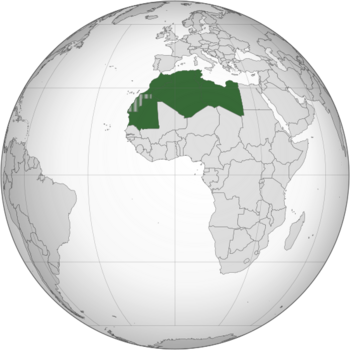Arab Maghreb Union facts for kids
Quick facts for kids
Arab Maghreb Union
إتحاد المغرب العربي
|
|
|---|---|
 |
|
| Seat of Secretariat | Rabat, Morocco |
| Largest city | Casablanca, Morocco |
| Official language | Arabic |
| Demonym(s) | Maghrebis |
| Member states | |
| Leaders | |
|
• Secretary General
|
Taïeb Baccouche |
| Area | |
|
• Total
|
6,046,441 km2 (2,334,544 sq mi) (7th) |
| Population | |
|
• 2020 estimate
|
102,877,547 (13th) |
|
• Density
|
17/km2 (44.0/sq mi) (217th) |
| GDP (PPP) | 2020 estimate |
|
• Total
|
$1.299173 trillion (23rd) |
|
• Per capita
|
$12,628 |
| GDP (nominal) | 2020 estimate |
|
• Total
|
$382.780 billion (37st) |
|
• Per capita
|
$3,720 |
| Gini (2012) | ▼ 32.8 medium |
| HDI (2019) | high · 106th |
| Currency | |
The Arab Maghreb Union (AMU) is a group of five countries in North Africa. These countries are Algeria, Libya, Mauritania, Morocco, and Tunisia. The AMU was created to help these countries work together. Their main goals are to improve their economies and become more politically united.
The name "Maghreb" comes from Arabic. It means "the West" and refers to this part of North Africa. The AMU aims to boost trade and cooperation among its members. However, the Union has faced challenges. Strong disagreements between Morocco and Algeria have slowed its progress. These issues include the future of Western Sahara. Because of these problems, the AMU has not held high-level meetings since 2008. Many people now see the Union as not very active.
Contents
How the AMU Started
The idea for countries in the Maghreb to work together began in 1956. This was when Tunisia and Morocco became independent. It took many years for the idea to become real. In 1988, the five Maghreb countries held their first meeting.
The Arab Maghreb Union was officially formed on February 17, 1989. The member countries signed a treaty in Marrakech, Morocco. The treaty states that the AMU wants to help its members cooperate. It also aims to strengthen their independence. The region is important because it has large amounts of oil, gas, and phosphates. It is also a key route for trade to southern Europe. A successful Union would be very good for the economies of these countries.
How the AMU Works
The leadership of the AMU changes regularly. Each member country takes a turn being in charge. The current Secretary-General is Taïeb Baccouche from Tunisia. He helps manage the Union's daily activities.
Member Countries
The Arab Maghreb Union has five member states. All of them are located in North Africa.
In 1994, Egypt also asked to join the AMU. This happened during a meeting of the AMU Foreign Ministers in Algiers.
Economy of the AMU
The AMU combines the economies of its five member states. All these countries are mainly Arab and Muslim nations. Together, the AMU countries have a large economy. Their combined GDP (Gross Domestic Product) is about $1.276 trillion. GDP measures the total value of goods and services produced in a country.
The table below shows some economic facts for each AMU member.
| Country | GDP (nominal) | GDP (PPP) | GDP (nominal) per capita | GDP (PPP) per capita | HDI |
|---|---|---|---|---|---|
| 200,171,000,000 | 693,109,000,000 | 4,645 | 16,085 | 0.754 | |
| 51,330,000,000 | 79,595,000,000 | 7,803 | 12,100 | 0.706 | |
| 5,243,000,000 | 19,472,000,000 | 1,291 | 4,797 | 0.520 | |
| 122,458,000,000 | 332,358,000,000 | 3,441 | 9,339 | 0.667 | |
| 42,277,000,000 | 151,566,000,000 | 3,587 | 12,862 | 0.735 | |
| Arab Maghreb Union | 421,479,000,000 | 1,276,100,000,000 | 3,720 | 12,628 | 0.707 |
Challenges and Future
The AMU has faced many challenges. One big issue is the long-standing rivalry between Morocco and Algeria. This disagreement is mainly about Western Sahara. Western Sahara is a territory south of Morocco. Morocco considers it part of its country. However, some people in Western Sahara want to be independent. Algeria supports their right to self-determination.
This disagreement has stopped many AMU meetings since the 1990s. For example, in 2005, Morocco refused to attend a meeting because of Algeria's support for Western Sahara's independence. The United Nations has tried to help solve this issue, but it remains unresolved.
Another challenge came in 1994. Algeria decided to pass the AMU presidency to Libya. This happened because leaders from Morocco and Libya often didn't attend meetings in Algiers. The Libyan leader, Muammar Gaddafi, then said it was time to put the Union "in the freezer." This showed how difficult it was to keep the Union active.
More recently, in 2023, the idea of a single currency for the region was discussed. Experts found it possible from a technical view. However, political disagreements made it impossible to move forward.
In April 2024, Algeria, Tunisia, and Libya started talking about forming a new group. They see the Arab Maghreb Union as "inoperative." This new group would focus on shared border security. They also plan to work together on big projects. These include growing cereals and turning seawater into fresh water. They also want to make it easier for people and goods to move between their three countries. This shows that while the AMU faces difficulties, the idea of regional cooperation is still important.
See Also
- Maghrebis
- African Economic Community (AEC)
- Arab League
- Common Market for Eastern and Southern Africa (COMESA)
- Economic Community of West African States (ECOWAS)
- Euro-Mediterranean free trade area (EU-MEFTA)
- Greater Arab Free Trade Area (GAFTA)
- List of trade blocs
- US - Middle East Free Trade Area (US-MEFTA)
- African Union (AU)
- Union for the Mediterranean (UfM)
 | Isaac Myers |
 | D. Hamilton Jackson |
 | A. Philip Randolph |


